Chapter: 11th 12th std standard Class Physics sciense Higher secondary school College Notes
Dispersion of light and Dispersive power
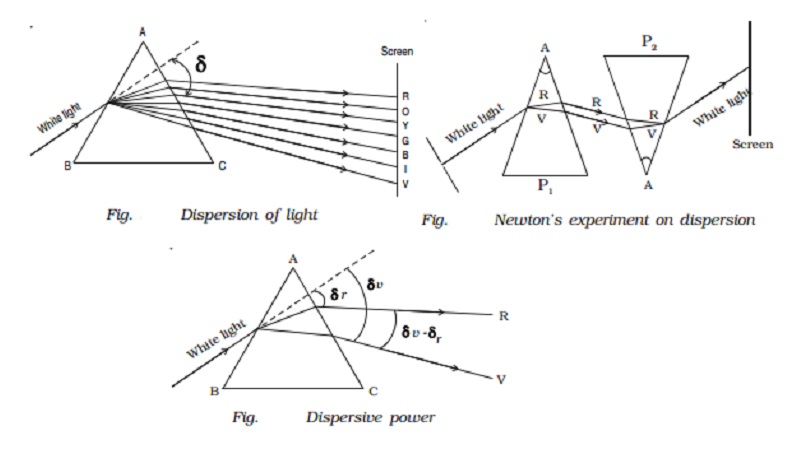
Dispersion of light
Dispersion is the splitting of white light into its constituent
colours. This band of colours of light is called its spectrum.
In the visible region of spectrum, the spectral lines are seen
in the order from violet to red. The colours are given by the word VIBGYOR
(Violet,Indigo, Blue, Green,Yellow, Orange and Red) (Fig. )
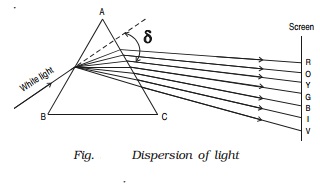
The origin of colour after passing through a prism was a matter
of much debate in physics. Does the prism itself create colour in some
way or does it only separate the colours already present in
white light?
Sir Isaac Newton gave an explanation for this. He placed another
similar prism in an inverted position. The emergent beam from the first
prism was made to fall on the second prism (Fig. ). The
resulting emergent beam was found to be white light. The first prism separated
the white light into its constituent colours, which were then recombined by the inverted prism to
give white light. Thus it can be concluded that the prism does not create any
colour but it only separates the white light into its constituent colours.
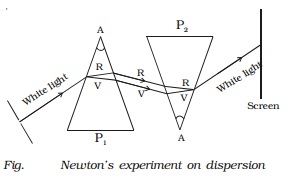
Dispersion takes place
because the refractive index of the material of the prism is different for
different colours (wavelengths). The deviation and hence the refractive index
is more for violet rays of light than the corresponding values for red rays of
light. Therefore the violet ray travels with a smaller velocity in glass prism
than red ray. The deviation and the refractive index of the yellow ray are
taken as the mean values. Table 9.2 gives the refractive indices for different
wavelength for crown glass and flint glass.
Table List Refractive indices for different
wavelengths
Colour Wave length (nm) Crown glass Flint glass
Violet 396.9 1.533 1.663
Blue 486.1 1.523 1.639
Yellow 589.3 1.517 1.627
Red 656.3 1.515 1.622
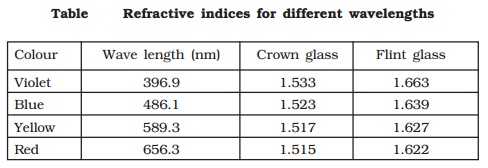
The speed of light is
independent of wavelength in vacuum. Therefore vacuum is a non-dispersive
medium in which all colours travel with the same speed.
Dispersive power
The refractive index
of the material of a prism is given by the relation ? = [sin(A+D / 2)] /
[sin(A/2)]
Here A is the angle of the prism and D is the angle of minimum
deviation.
If the angle of prism is small of the order of 10o,
the prism is said to be small angled prism. When rays of light pass through
such prisms
the angle of deviation also becomes small.
If A be the refracting angle
of a small angled prism and δ the angle of deviation, then the prism formula
becomes ? = [sin(A+δ)/2]/sin(A/2)
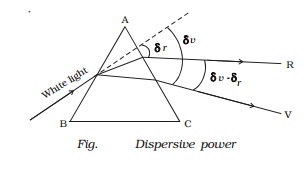
For small angles A and δ,
Sin[(A+δ )/2] = (A+δ )/2 and sin(A/2)=A/2
? = [(A+δ)/2] / [A/2]
? A = A + δ
δ = (? - 1)A ... (1)
If δv and δr are the
deviations produced for the violet and red rays and ?v and ?r
are the corresponding refractive indices of the material of the small angled
prism then,
for violet light, δv
=( ? -1
)A ????..(2)
for red light, δ r = ( ? r -1
)A ????..(3)
From equations (2) and (3)
δv - δr = ( ?v - ?r
)A ?????.(4)
δv - δr is called the angular dispersion
which is the difference in deviation between the extreme colours (Fig. ).
If δy and ?y are the deviation and refractive index
respectively for yellow ray (mean wavelength) then,
for yellow light, δ y =( ?y -1) A ... (5)
Dividing equation (4) by (5) we get
δv-δr / δy = ( ?v
- ?r )/
( ?y
? 1)
The expression ( δv ?δ r) / (δy) is known as the dispersive
power of the material of the prism and is denoted by ω.
ω = ( ?v
- ?r )/
( ?y
? 1)
The dispersive power of the material of a
prism is defined as the ratio of angular dispersion for any two wavelengths
(colours) to the deviation of mean wavelength.
Related Topics